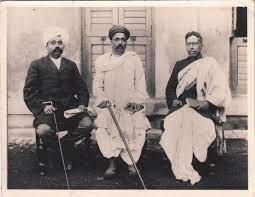Lal Bal Pal: The Triumvirate of Indian Nationalism

Introduction: Lal Bal Pal: The Triumvirate of Indian Nationalism
In the annals of Indian history, there emerges a triumvirate that played a pivotal role in shaping the course of the nation’s struggle for independence. Lala Lajpat Rai, Bal Gangadhar Tilak, and Bipin Chandra Pal, collectively known as Lal Bal Pal, were stalwarts who left an indelible mark on the Indian nationalist movement during the late 19th and early 20th centuries. This blog post delves into the lives, contributions, and enduring legacy of Lal Bal Pal.
Lala Lajpat Rai: Lal Bal Pal
Lala Lajpat Rai, also known as Punjab Kesari (Lion of Punjab), was born on January 28, 1865. An ardent nationalist and social reformer, Rai was a prominent leader in the Indian Nationalist Movement. His fervent advocacy for the rights of farmers and workers, coupled with his passionate speeches, earned him widespread respect.
Rai’s notable involvement in the non-cooperation movement and his steadfast resistance against the Simon Commission showcased his dedication to the cause of Indian independence. Tragically, he succumbed to injuries sustained during a baton charge by the police, becoming a martyr for the nation.
Bal Gangadhar Tilak: Lal Bal Pal
Bal Gangadhar Tilak, often hailed as Lokmanya (Beloved of the People), was born on July 23, 1856. A scholar, teacher, and freedom fighter, Tilak played a crucial role in the early phase of the Indian independence movement. He was a strong proponent of Swaraj (self-rule) and believed in the importance of using indigenous methods to achieve it.
Tilak’s emphasis on public celebration of festivals like Ganesh Chaturthi and Shivaji Jayanti helped galvanize the masses and foster a sense of unity. His famous slogan “Swaraj is my birthright and I shall have it” resonated with millions, inspiring a generation to strive for freedom.
Bipin Chandra Pal: Lal Bal Pal
Bipin Chandra Pal, born on November 7, 1858, was a dynamic orator, writer, and one of the key figures in the Indian nationalist movement. A fervent advocate of social reform and the promotion of indigenous industries, Pal was committed to instilling a sense of national pride and self-reliance.
Pal, along with Lala Lajpat Rai and Bal Gangadhar Tilak, founded the Swadeshi Movement, encouraging Indians to boycott British goods and promote indigenous products. His writings and speeches ignited the spirit of nationalism, influencing a wide spectrum of society.
Legacy:
The Lal Bal Pal triumvirate, through their unwavering commitment to the cause of Indian independence, laid the foundation for future generations of freedom fighters. Their emphasis on Swadeshi, Swaraj, and the empowerment of the common people resonated throughout the struggle against colonial rule.
The legacy of Lal Bal Pal endures in the collective memory of the nation. Their sacrifices, teachings, and ideals continue to inspire individuals to strive for justice, equality, and the betterment of society. As we commemorate the contributions of these titans of Indian nationalism, we are reminded of the power of unity, resilience, and the indomitable spirit of a people determined to chart their own destiny.










